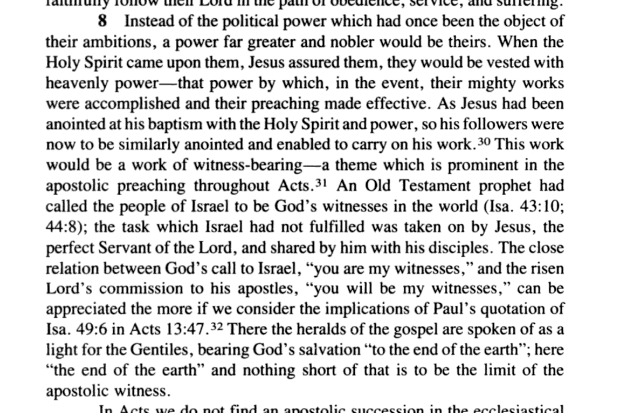Acts 1
|
Act 1:1:
The former treatise have I made, O Theophilus, of all that Jesus began both to do and teach, |
The former treatise.--Literally, word, or discourse; but the English of the text is, perhaps, a happier equivalent than either. The adjective is strictly "first" rather than "former," and the tense of the verb, "I made," rather than "I have made. " The former treatise have I made,.... Meaning the Gospel written by him the Evangelist Luke, for from that he makes a transition to this, beginning here where he there left off; namely, at the ascension of Christ; see Luke 24:51. -Gills Exposition |

“It seemed good to me also, having followed all things closely for some time past, to write an orderly account for you, most excellent Theophilus, that you may know the truth concerning the things of which you have been informed . . .” (Luke 1:3-4). These two mentions of Theophilus (Acts 1 & Luke 1) are a major reason for experts’ consensus that Luke and Acts are linked as volumes 1 and 2 and almost certainly the work of the same author. Since Theophilus means “friend” or “lover” of God, some have theorized that this wasn’t the name of an actual person but a symbol for all God-lovers who wish to learn more about the history of Jesus (Volume 1) with added information about church origins (Volume 2). Henry Wansbrough, a member of the Vatican’s Pontifical Biblical Commission, thought “we can never know whether there was a real person.”
 Bob Barber
Bob Barber
So, what we have here in what we call the Acts of the Apostles is a Holy Spirit inspired record of the message and action of the Apostles. Luke introduces the letter by highlighting an important principle… “In the first book, O Theophilus, I have dealt with all that Jesus began to do and teach,” (Acts 1:1). We note that Luke’s emphasis on the indispensable bond between preaching and practice reflects the pattern of our Lord Jesus Christ, who taught us to love our enemies and then demonstrated this lesson on the cross, when he prayed for those who were crucifying him… “Father, forgive them, for they know not what they do” (Luke 23:34). The message and actions of the Apostles recorded for us here in the Book of Acts challenge us to share our faith in both words and deeds and inspire us to grow up into Christ by imitating them as they imitated Christ. -Bob Barber; The Classical Christian Difference; Preaching and Practice 1/12/18
|
|
Theophilus is the name or honorary title of the person to whom the Gospel of Luke and the Acts of the Apostles are addressed (Luke 1:3, Acts 1:1). It is thought that both the Gospel of Luke and Acts of the Apostles were written by the same author, and often argued that the two books were originally a single unified work. Both Luke and Acts were written in a refined Koine Greek, and the name "θεόφιλος" ("Theophilos"), as it appears therein, means friend of God or (be)loved by God or loving God in the Greek language. |
Theophilus was the person for whom Luke originally wrote his two books: the Gospel of Luke and Acts of the Apostles. About 26% of Luke's writing in the New Testament was written to Theophilus. Luke’s desire was to prove to Theophilus the truth of Jesus the Messiah’s life, death and resurrection. The name Theophilus appears in only two places in the Bible, Luke 1:1-4 and Acts 1:1-3. Luke wrote these two books around 61-63 AD which is during the time that the Apostle Paul was a prisoner in Rome and Luke was with him. (See 2 Timothy 4:11).
|
Acts 1:2:
until the day he was taken up to heaven, after giving instructions through the Holy Spirit to the apostles he had chosen. |
Jesus had an appointed time in which to be taken up to heaven and it was after the Holy Spirit had given instruction. Note that the apostles were of his choosing. |
 John Piper
John Piper
To be the instrument of Jesus as he works and speaks in the world, the apostles needed a command, or commission, or an authorization that came with the authentication of the Holy Spirit. When Luke says that he gave them command through the Holy Spirit, it might mean simply that Jesus was prompted by the Holy Spirit to give the Great Commission to preach (Acts 10:42; Luke 24:47) and make disciples (Matthew 28:19). But I think Luke means for this to have relevance for the way the apostles themselves received the command, not just the way Jesus thought of it.
In John 20:21–22, there is one description of a commission that Jesus gave the apostles after his resurrection. Notice the role of the Holy Spirit here:
Jesus said to them again, “Peace be with you. As the Father has sent me, even so send I you.” [There’s the commissioning.] And when he had said this, he breathed on them, and said to them, “Receive the Holy Spirit.”
Doesn’t that sound like a situation which Luke might describe as giving commandment through the Holy Spirit? Some people say this is a kind of acted-out parable of what would happen at Pentecost when the Holy Spirit filled the apostles (Acts 2:4). But the more I think about the freedom and variety of the work of the Holy Spirit, the less I feel constrained to see this as a parabolic action. Why can we not simply say that when Jesus breathed on them and said, “Receive the Holy Spirit,” there was a real ministry of the Holy Spirit in the lives of the apostles for that moment and that situation and for the understanding and appropriation and processing of that commission?
That is what I suggest Luke means when he says that Jesus gave them a commandment through the Holy Spirit. It was through the ministry of the Holy Spirit that he spoke, and through the ministry of the Holy Spirit that they received, the word of commission. The Spirit helped them in those days before Pentecost to understand the command (Luke 24:45) and to accept the command and to be glad with the command (Luke 24:52). And this in no way contradicts that on the day of Pentecost something more happened, something deeply empowering for the fulfillment of the commission that Jesus had given them through the Holy Spirit. We will talk about that next week (Acts 1:4–5). So to be the instrument of Jesus as he works and speaks in the world, the first thing the apostles needed was a commission that came with the authentication of the Holy Spirit. That’s the point of verse 2. --John Piper; Desiring God; What Jesus Did After the Beginning 9.16.90
In John 20:21–22, there is one description of a commission that Jesus gave the apostles after his resurrection. Notice the role of the Holy Spirit here:
Jesus said to them again, “Peace be with you. As the Father has sent me, even so send I you.” [There’s the commissioning.] And when he had said this, he breathed on them, and said to them, “Receive the Holy Spirit.”
Doesn’t that sound like a situation which Luke might describe as giving commandment through the Holy Spirit? Some people say this is a kind of acted-out parable of what would happen at Pentecost when the Holy Spirit filled the apostles (Acts 2:4). But the more I think about the freedom and variety of the work of the Holy Spirit, the less I feel constrained to see this as a parabolic action. Why can we not simply say that when Jesus breathed on them and said, “Receive the Holy Spirit,” there was a real ministry of the Holy Spirit in the lives of the apostles for that moment and that situation and for the understanding and appropriation and processing of that commission?
That is what I suggest Luke means when he says that Jesus gave them a commandment through the Holy Spirit. It was through the ministry of the Holy Spirit that he spoke, and through the ministry of the Holy Spirit that they received, the word of commission. The Spirit helped them in those days before Pentecost to understand the command (Luke 24:45) and to accept the command and to be glad with the command (Luke 24:52). And this in no way contradicts that on the day of Pentecost something more happened, something deeply empowering for the fulfillment of the commission that Jesus had given them through the Holy Spirit. We will talk about that next week (Acts 1:4–5). So to be the instrument of Jesus as he works and speaks in the world, the first thing the apostles needed was a commission that came with the authentication of the Holy Spirit. That’s the point of verse 2. --John Piper; Desiring God; What Jesus Did After the Beginning 9.16.90

Clarkes Bible Commentary: After that he, through the Holy Ghost, &c.] This clause has been variously translated: the simple meaning seems to be this-that Christ communicated the Holy Spirit to his disciples, after his resurrection, as he had not done before. In Luke xxiv. 45, it is said that he opened their understanding, that they might understand the Scriptures; and in John xx. 22, that he breathed on them, and said, receive ye the Holy Ghost.
Previously to this, we may suppose that the disciples were only on particular occasions made partakers of the Holy Spirit; but from this time it is probable that they had a measure of this supernatural light and power constantly resident in them. By this they were not only able to proclaim the truth, but to discern the meaning of all the Old Testament Scriptures which referred to Christ; and to appoint whatever rites or ordinances were necessary for the establishment of his Church. There were many things which the apostles said, did, and decreed, for which they had no verbal instructions from our Lord, at least, none that are recorded in the Gospels; we may therefore conclude that these were suggested to them by that Holy Spirit which now became resident in them, and that it is to this that St. Luke refers in this verse, After that he, through the Holy Ghost, had given commandments unto the apostles.
Previously to this, we may suppose that the disciples were only on particular occasions made partakers of the Holy Spirit; but from this time it is probable that they had a measure of this supernatural light and power constantly resident in them. By this they were not only able to proclaim the truth, but to discern the meaning of all the Old Testament Scriptures which referred to Christ; and to appoint whatever rites or ordinances were necessary for the establishment of his Church. There were many things which the apostles said, did, and decreed, for which they had no verbal instructions from our Lord, at least, none that are recorded in the Gospels; we may therefore conclude that these were suggested to them by that Holy Spirit which now became resident in them, and that it is to this that St. Luke refers in this verse, After that he, through the Holy Ghost, had given commandments unto the apostles.

“after giving instructions through the Holy Spirit to the apostles.” What does that phrase mean? To set the context, we have to remember that the Book of Acts is a history of transition, from the time of Jesus in visible form, to the time of Jesus in invisible form. When Jesus was with them, he taught the disciples directly, he instructed them, he encouraged them, he trained them how to be Christians, how to live, think, and speak. But after the resurrection, Jesus would only appear to them from time to time for a period of some 40 days, and then after that, he didn’t appear any more visibly, but lived with them invisibly through the presence and power of the Holy Spirit. So the Book of Acts is an account of the transition time, from the visible Jesus to the invisible Jesus. We live in the time of the invisible Jesus, but when the Book of Acts starts Jesus is still visible from time to time, then later, Jesus ascends to heaven and the invisible Jesus period begins.
“until the day he gave his instructions to the apostles he had chosen through the Holy Spirit, and was taken up to heaven.” According to this Bible translation, the Holy Spirit assists in choosing the apostles not instructing them. This strange version plays with the word order in the sentence and makes it appear that there is nothing unusual or spiritual about how Jesus instructs his disciples. In other words, according to this Bible Jesus simply instructed his disciples like he did before thousands of times during his ministry.
Now while most Bible translations translate this verse to mean that Jesus taught his disciples through the Holy Spirit, many Christians believe that what it means is that Jesus simply instructed the disciples in the normal way that he always did and that just as before, they needed the Holy Spirit to open their minds to understand the meaning. In other words, for many Christians when they look at this verse they see it as a typical example of the importance of the Holy Spirit always in teaching God’s Word. Unless the Holy Spirit opens the hearts and the minds of people during the teaching of the Word of God nobody can even understand. So in this way, the Holy Spirit is always needed for Jesus to teach anybody anything. That was the way it was before the resurrection, that’s the way it is now after the resurrection. There is much truth in this understanding of the verse, after all we see examples of this in other passages of the New Testament. For example, remember the time when Jesus asked Peter, “Who do you say that I am?” To which Peter replies, “You are the Christ, the Son of the Living God.” Jesus replies to Peter, “Flesh and blood have not revealed this to you Peter but my Father in heaven.” While not mentioning the Holy Spirit, it’s clear that the truth of Jesus was revealed to Peter; and he didn’t just learn it naturally listening to Jesus or talking with others. Now today, there are many Christians who try to limit God’s revelation of himself to the Words of the Bible only. In other words, God doesn’t reveal himself apart from the words of the Bible. The Holy Spirit opens the eyes of those who read the Bible and God is revealed to them. Apart from the Bible or God’s Word, God doesn’t reveal himself today. The problem with this view is that it requires God to act different today than he did in the early church. The Bible was produced, as all prophecy has ever been produced, through the revelation of God through the Holy Spirit. While God is no longer inspiring the writing of the Bible, He certainly is still revealing himself through his Spirit, not only through the Bible but through direct revelation as well. The early church believed that God was able and willing to instruct anyone at any time through the Spirit directly. That doesn’t mean that everything everyone claims is from the Holy Spirit because it’s possible to be mistaken. That’s why many Christians try to limit God’s instructions to the Bible, because it’s hard to judge between a real revelation from God and a mistaken claim to the same. Just because someone claims the Holy Spirit spoke to them doesn’t mean He has, nor does it mean that He hasn’t. Like the Bible says, we must test all things.
In this verse, Jesus isn’t simply teaching the disciples the way he always did, he was training his disciples to listen to the Spirit speak apart from the visible presence of Christ. For 40 days Jesus would appear and disappear, come and go. He would go away and instruct them apart from his visible presence, then he would return and ask if they understood what he was teaching them while he was gone. This forced them to listen and focus in prayer and do spiritual reflection in order to hear what the Spirit was teaching. Didn’t Jesus say elsewhere that when he goes he would send the Spirit who would lead them into all truth? He wasn’t just talking about recalling all that Jesus taught when he was visibly with them, but also things that he would later reveal to them through the Holy Spirit. Now at this point they had not been baptized in the Holy Spirit which would come on the Day of Pentecost, but they did have the Holy Spirit in some sense, because in the Gospel of John after the account of the resurrection, Jesus breathes on them and says, “Receive the Holy Spirit.” So they had something of the Holy Spirit, even though they didn’t have the fullness of the Holy Spirit. During the 40 days that Jesus was appearing and reappearing to them after the resurrection but before the ascension, Jesus was training them to hear the voice of the Spirit, something they would need later in establishing the church, and something every Christian would need in living a truly Christian life. So what does the little phrase, “giving instructions through the Holy Spirit” mean? It means that Jesus would leave these disciples for a while, yet continue to speak to them and instruct them. Then he would return visibly to them and see if they picked up on what he was teaching them through the invisible Holy Spirit apart from his visible presence. Would they hear the Spirit? Were they sensitive enough to pick up on the “still, small voice” of the Spirit speaking to each of them? Could they come together and piece together truth from God’s Spirit apart from Jesus teaching them directly in visible form? This is what they had to learn because Jesus wasn’t always going to be with them; they would need to hear the invisible Spirit in order to know what to do and say later on. Did they learn to hear the Spirit eventually? From later in the Book of Acts it looks like they did. Acts 15 describes the famous Jerusalem Council where all the disciples gathered to discuss the issue of whether Gentiles could become Christians without converting to Judaism. Here is their decision in Acts 15:28, “It seemed good to the Holy Spirit and to us not to burden you with anything beyond the following requirements . . .” They had learned to hear the instructions of Jesus through the Holy Spirit apart from the visible Jesus! This is what Jesus was trying to teach them.
Most of what the Holy Spirit is teaching is found in the Bible already, since we know that the Bible was created under inspiration of the Holy Spirit, as it says in 2 Peter 1:21, “For prophecy never had its origin in the will of man, but men spoke from God as they were carried along by the Holy Spirit.” But that doesn’t mean that the only instruction we’ll get from the Holy Spirit will only come from reading the Bible. Most of what God wants to say to us today comes from the Bible and we should never neglect the Bible or belittle it. But some of what God wants to say to us today comes directly through the Holy Spirit. Do you know how to listen to the Holy Spirit? Jesus had to train the disciples how to listen to the Holy Spirit in order to get more instructions from him after he ascended into heaven. Once Jesus ascended into heaven out of their sight that was the last time he appeared and instructed them on anything. They had to have a means of staying in touch with Jesus even after he left them visibly. That means was through the instruction of the Holy Spirit. But that means isn’t as straightforward as Jesus visibly teaching them. The ‘still, small voice” of the Spirit isn’t something that is easy to pick up on even for mature Christians. It takes training and practice and focus to concentrate long enough and pray in order to hear a message from the Spirit. And even then, it’s so easy to be mistaken. I’ve mentioned the phrase, “still, small voice” a number of times, where do I get that? It comes from an account in the Old Testament where Elijah went up on a mountain and where there was thunder and lightening, but it says that God didn’t speak through these powerful means, but only in a “still, small voice,” a whisper that barely made it over the sound of the wind. That’s the way the Holy Spirit speaks today. It’s always possible to question whether you really have a message or not from the Holy Spirit because it’s almost always very soft or small. Unlike when Jesus taught the disciples when he was visible – that was loud and clear – the Holy Spirit speaks soft and still. That’s why it’s very easy to misinterpret what the Spirit is saying and be mistaken. That’s why some people dismiss all so-called revelations of the Spirit today. That’s why some people don’t ever listen to the Spirit – it’s not clear and distinct like Bible instructions. But if we are willing to pray and reflect and meditate on God and ask him to guide, direct, and instruct us, then we may be able to hear what the Spirit is saying to us directly. Certainly we should be open-minded to anything from God.
“until the day he gave his instructions to the apostles he had chosen through the Holy Spirit, and was taken up to heaven.” According to this Bible translation, the Holy Spirit assists in choosing the apostles not instructing them. This strange version plays with the word order in the sentence and makes it appear that there is nothing unusual or spiritual about how Jesus instructs his disciples. In other words, according to this Bible Jesus simply instructed his disciples like he did before thousands of times during his ministry.
Now while most Bible translations translate this verse to mean that Jesus taught his disciples through the Holy Spirit, many Christians believe that what it means is that Jesus simply instructed the disciples in the normal way that he always did and that just as before, they needed the Holy Spirit to open their minds to understand the meaning. In other words, for many Christians when they look at this verse they see it as a typical example of the importance of the Holy Spirit always in teaching God’s Word. Unless the Holy Spirit opens the hearts and the minds of people during the teaching of the Word of God nobody can even understand. So in this way, the Holy Spirit is always needed for Jesus to teach anybody anything. That was the way it was before the resurrection, that’s the way it is now after the resurrection. There is much truth in this understanding of the verse, after all we see examples of this in other passages of the New Testament. For example, remember the time when Jesus asked Peter, “Who do you say that I am?” To which Peter replies, “You are the Christ, the Son of the Living God.” Jesus replies to Peter, “Flesh and blood have not revealed this to you Peter but my Father in heaven.” While not mentioning the Holy Spirit, it’s clear that the truth of Jesus was revealed to Peter; and he didn’t just learn it naturally listening to Jesus or talking with others. Now today, there are many Christians who try to limit God’s revelation of himself to the Words of the Bible only. In other words, God doesn’t reveal himself apart from the words of the Bible. The Holy Spirit opens the eyes of those who read the Bible and God is revealed to them. Apart from the Bible or God’s Word, God doesn’t reveal himself today. The problem with this view is that it requires God to act different today than he did in the early church. The Bible was produced, as all prophecy has ever been produced, through the revelation of God through the Holy Spirit. While God is no longer inspiring the writing of the Bible, He certainly is still revealing himself through his Spirit, not only through the Bible but through direct revelation as well. The early church believed that God was able and willing to instruct anyone at any time through the Spirit directly. That doesn’t mean that everything everyone claims is from the Holy Spirit because it’s possible to be mistaken. That’s why many Christians try to limit God’s instructions to the Bible, because it’s hard to judge between a real revelation from God and a mistaken claim to the same. Just because someone claims the Holy Spirit spoke to them doesn’t mean He has, nor does it mean that He hasn’t. Like the Bible says, we must test all things.
In this verse, Jesus isn’t simply teaching the disciples the way he always did, he was training his disciples to listen to the Spirit speak apart from the visible presence of Christ. For 40 days Jesus would appear and disappear, come and go. He would go away and instruct them apart from his visible presence, then he would return and ask if they understood what he was teaching them while he was gone. This forced them to listen and focus in prayer and do spiritual reflection in order to hear what the Spirit was teaching. Didn’t Jesus say elsewhere that when he goes he would send the Spirit who would lead them into all truth? He wasn’t just talking about recalling all that Jesus taught when he was visibly with them, but also things that he would later reveal to them through the Holy Spirit. Now at this point they had not been baptized in the Holy Spirit which would come on the Day of Pentecost, but they did have the Holy Spirit in some sense, because in the Gospel of John after the account of the resurrection, Jesus breathes on them and says, “Receive the Holy Spirit.” So they had something of the Holy Spirit, even though they didn’t have the fullness of the Holy Spirit. During the 40 days that Jesus was appearing and reappearing to them after the resurrection but before the ascension, Jesus was training them to hear the voice of the Spirit, something they would need later in establishing the church, and something every Christian would need in living a truly Christian life. So what does the little phrase, “giving instructions through the Holy Spirit” mean? It means that Jesus would leave these disciples for a while, yet continue to speak to them and instruct them. Then he would return visibly to them and see if they picked up on what he was teaching them through the invisible Holy Spirit apart from his visible presence. Would they hear the Spirit? Were they sensitive enough to pick up on the “still, small voice” of the Spirit speaking to each of them? Could they come together and piece together truth from God’s Spirit apart from Jesus teaching them directly in visible form? This is what they had to learn because Jesus wasn’t always going to be with them; they would need to hear the invisible Spirit in order to know what to do and say later on. Did they learn to hear the Spirit eventually? From later in the Book of Acts it looks like they did. Acts 15 describes the famous Jerusalem Council where all the disciples gathered to discuss the issue of whether Gentiles could become Christians without converting to Judaism. Here is their decision in Acts 15:28, “It seemed good to the Holy Spirit and to us not to burden you with anything beyond the following requirements . . .” They had learned to hear the instructions of Jesus through the Holy Spirit apart from the visible Jesus! This is what Jesus was trying to teach them.
Most of what the Holy Spirit is teaching is found in the Bible already, since we know that the Bible was created under inspiration of the Holy Spirit, as it says in 2 Peter 1:21, “For prophecy never had its origin in the will of man, but men spoke from God as they were carried along by the Holy Spirit.” But that doesn’t mean that the only instruction we’ll get from the Holy Spirit will only come from reading the Bible. Most of what God wants to say to us today comes from the Bible and we should never neglect the Bible or belittle it. But some of what God wants to say to us today comes directly through the Holy Spirit. Do you know how to listen to the Holy Spirit? Jesus had to train the disciples how to listen to the Holy Spirit in order to get more instructions from him after he ascended into heaven. Once Jesus ascended into heaven out of their sight that was the last time he appeared and instructed them on anything. They had to have a means of staying in touch with Jesus even after he left them visibly. That means was through the instruction of the Holy Spirit. But that means isn’t as straightforward as Jesus visibly teaching them. The ‘still, small voice” of the Spirit isn’t something that is easy to pick up on even for mature Christians. It takes training and practice and focus to concentrate long enough and pray in order to hear a message from the Spirit. And even then, it’s so easy to be mistaken. I’ve mentioned the phrase, “still, small voice” a number of times, where do I get that? It comes from an account in the Old Testament where Elijah went up on a mountain and where there was thunder and lightening, but it says that God didn’t speak through these powerful means, but only in a “still, small voice,” a whisper that barely made it over the sound of the wind. That’s the way the Holy Spirit speaks today. It’s always possible to question whether you really have a message or not from the Holy Spirit because it’s almost always very soft or small. Unlike when Jesus taught the disciples when he was visible – that was loud and clear – the Holy Spirit speaks soft and still. That’s why it’s very easy to misinterpret what the Spirit is saying and be mistaken. That’s why some people dismiss all so-called revelations of the Spirit today. That’s why some people don’t ever listen to the Spirit – it’s not clear and distinct like Bible instructions. But if we are willing to pray and reflect and meditate on God and ask him to guide, direct, and instruct us, then we may be able to hear what the Spirit is saying to us directly. Certainly we should be open-minded to anything from God.
|
Acts 1:3:
After his suffering, he showed himself to these men and gave many convincing proofs that he was alive. He appeared to them over a period of forty days and spoke about the kingdom of God. |
Christ did not immediately ascend into heaven after his resurrection in order to thoroughly prove his resurrection, and with his presence strengthen and encourage his Apostles in the doctrine which they had heard. |
|
Acts 1:5:
For John truly baptized with water; but ye shall be baptized with the Holy Ghost not many days hence. |
On the temple mount were several mikvahs (baptism pools) that were used for ceremonial cleansings. These cleansings had to do with holiness. For example, when a Gentile converted to Judaism, he had to do three things; offer a sacrifice at the temple, be circumcised, and then be baptized (mikvahed). It was then that the convert was considered to be a true Israelite. But what did Jesus mean by the disciples being baptized in the Holy Spirit? This meant that in the new covenant, believers would be mikvahed (immersed) in the Spirit of Messiah, and thereby, would become a holy people to God. The baptism of the Holy Spirit is a term that speaks of the washing of regeneration. It is in this covenant experience that a believer receives the life of Messiah. Paul said, “For by one Spirit we were all baptized into one body, whether Jews or Greeks, whether slaves or free, and we were all made to drink of one Spirit.” (1Co12:13) The body we are emerged into is the body of Messiah, and the Spirit we drink of is the Spirit of Messiah. When the Lord compared John’s baptism to the baptism of the Holy Spirit, He is drawing attention both to the Messiah’s new covenant baptism, and also to a baptism of judgment. John said, “As for me, I baptize you with water for repentance, but He who is coming after me is mightier than I, and I am not fit to remove His sandals; He will baptize you with the Holy Spirit and fire.” (Matt3:11) -In Christ |
|
Acts 1:6-7:
When they therefore were come together, they asked of him, saying, Lord, wilt thou at this time restore again the kingdom to Israel? 7 And he said unto them, It is not for you to know the times or the seasons, which the Father hath put in his own power. |

Both words in Acts 1:7 can refer to time periods that could last many years. In Acts 1:21 the word “time” (chronos), which is frequently understood as a duration or span of time, refers to the entire ministry of Jesus with his disciples. It can also refer to a generation of forty years (Acts 13:18), or even an entire lifetime or longer (Acts 17:30; 1 Cor 7:39; 1 Pet 4:3).
The word for “periods” (of time), which is kairos, can be understood as a decisive point, “often with a stress on the fact that it is divinely ordained.”* It can refer to a year (Rev 12:12-14; compare 12:6), a season or a few years (Lk 4:13; Acts 14:17; Gal 4:10; 6:9; Philemon 15), a former disposition or an entire lifetime (Mark 10:30; Rom 2:12; 8:18), or the entire epoch (Luke 21:24; Rom 3:25–26; 2 Cor 6:2; 1 Pet 1:10–11). In the Greek version of the Old Testament (the Septuagint/ LXX) kairos and chronos can be connected together and refer to entire eras of successive kingdoms (Dan 2:21; compare 2:31–44). -In Christ |

Jesus designated this particular company of disciples to serve as his witnesses throughout the world, and they would do so in the power of the Holy Spirit. And it is clear that they took this charge seriously. We see this later in Chapter 1, when the apostles selected Matthias to replace Judas as one of the Twelve. This was necessary, the apostle Peter suggested, because one of those who had accompanied Jesus from the beginning “must become a witness with us to his resurrection” (1:22). -Firebrand
|

- January 28, 2022:
- Lee Strobel said the following in an announcement that he was headlining the 2022 Louisiana Baptist Evangelism Conference: “Evangelism is even more important today, but so is apologetics, or offering reasons for why we believe what we believe...My friend J. Warner Wallace, an atheist detective who came to Christ after his investigation of the Gospels, went so far as to say, ‘evangelism in the 21st Century is spelled apologetics.’ I think he’s on the right track. We need to help people know why we believe that Jesus is the unique Son of God. That’s going to be vitally important as we face a nation and world that are skeptical and sometimes even hostile toward our faith.” I agree and disagree with this. Apologetics is good to learn.. Sharpens the Bible knowledge. But, I believe every Christian has a testimony and a need to "testify" and give witness of why he or she believes what they do. But the commission in Acts 1:7–8 states Jesus said to the disciples, “It is not for you to know times or seasons that the Father has fixed by His own authority. But you will receive power when the Holy Spirit has come upon you, and you will be My witnesses in Jerusalem and in all Judea and Samaria, and to the end of the earth.” Maybe conferences like the one Strobel mentions is helpful for some, but for the vast number of people who cannot attend such conferences...God has provided a way that keeps your testimony real that has no urgent need for conference. In 3 words: "Read Your Bible.": 2 Timothy 3:16–17: All Scripture is breathed out by God and profitable for teaching, for reproof, for correction, and for training in righteousness, that the man of God may be complete, equipped for every good work.
|
9 And when he had spoken these things, while they beheld, he was taken up; and a cloud received him out of their sight.
10 And while they looked stedfastly toward heaven as he went up, behold, two men stood by them in white apparel; 11 Which also said, Ye men of Galilee, why stand ye gazing up into heaven? this same Jesus, which is taken up from you into heaven, shall so come in like manner as ye have seen him go into heaven. 12 Then returned they unto Jerusalem from the mount called Olivet, which is from Jerusalem a sabbath day's journey. |

Here we have three additional elements. The first element is that the disciples observe him rising. He doesn't just disappear, but first begins to rise. The Greek verb epairō means, "raise." The second element mentions that a cloud hides him from sight. The third element is a pair of angels who announce, "This same Jesus, who has been taken from you into heaven, will come back in the same way you have seen him go into heaven."
How does Jesus ascend into heaven? Into a cloud. Then how will he return? In a cloud. As Jesus relates the end-time events, he says, "At that time they will see the Son of Man coming in a cloud with power and great glory" (Luke 21:27). --Jesus Walk |
|
13 And when they were come in, they went up into an upper room, where abode both Peter, and James, and John, and Andrew, Philip, and Thomas, Bartholomew, and Matthew, James the son of Alphaeus, and Simon Zelotes, and Judas the brother of James.
14 These all continued with one accord in prayer and supplication, with the women, and Mary the mother of Jesus, and with his brethren. 15 And in those days Peter stood up in the midst of the disciples, and said, (the number of names together were about an hundred and twenty,) |

Only a handful of people met Jesus in the days immediately following his resurrection. But that handful soon became “about 120” Christ-followers (Acts 1:15) who were “all together in one place” at Pentecost (Acts 2:1).
Each was then “filled with the Holy Spirit and began to speak in other tongues as the Spirit gave them utterance” (v. 4). In response, “the multitude came together, and they were bewildered, because each one was hearing them speak in his own language” (v. 6). This miracle then led to Peter’s Pentecost sermon and the salvation of “about three thousand souls” (v. 41). We don’t know the names of most of the 120 disciples, but we stand in their spiritual lineage. The same is true for the “more than five hundred brothers” who met Jesus after his resurrection (1 Corinthians 15:6). -Jim Denison |
|
Acts 1:16-17:
16 Men and brethren, this scripture must needs have been fulfilled, which the Holy Ghost by the mouth of David spake before concerning Judas, which was guide to them that took Jesus. 17 For he was numbered with us, and had obtained part of this ministry. |
Remember, Judas had been with them for 3 years and was even their treasurer. We know Judas had a part, but it wasn't a spiritual part. *Just like always, not all who say they believe are true believers! 2. If you remember, Jesus had said that Judas had a devil from the beginning. Though Judas had fooled the others, he had not fooled Christ. John 6:64, 70-71 - But there are some of you that believe not. For Jesus knew from the beginning who they were that believed not, and who should betray him. John 6:70 Jesus answered them, Have not I chosen you twelve, and one of you is a devil? John 6:71 He spake of Judas Iscariot the son of Simon: for he it was that should betray him, being one of the twelve. |
Acts 1:18-26:
18 Now this man purchased a field with the reward of iniquity; and falling headlong, he burst asunder in the midst, and all his bowels gushed out.
19 And it was known unto all the dwellers at Jerusalem; insomuch as that field is called in their proper tongue, Aceldama, that is to say, The field of blood.
20 For it is written in the book of Psalms, Let his habitation be desolate, and let no man dwell therein: and his bishoprick let another take.
21 Wherefore of these men which have companied with us all the time that the Lord Jesus went in and out among us,
22 Beginning from the baptism of John, unto that same day that he was taken up from us, must one be ordained to be a witness with us of his resurrection.
23 And they appointed two, Joseph called Barsabas, who was surnamed Justus, and Matthias.
24 And they prayed, and said, Thou, Lord, which knowest the hearts of all men, shew whether of these two thou hast chosen,
25 That he may take part of this ministry and apostleship, from which Judas by transgression fell, that he might go to his own place.
26 And they gave forth their lots; and the lot fell upon Matthias; and he was numbered with the eleven apostles.
18 Now this man purchased a field with the reward of iniquity; and falling headlong, he burst asunder in the midst, and all his bowels gushed out.
19 And it was known unto all the dwellers at Jerusalem; insomuch as that field is called in their proper tongue, Aceldama, that is to say, The field of blood.
20 For it is written in the book of Psalms, Let his habitation be desolate, and let no man dwell therein: and his bishoprick let another take.
21 Wherefore of these men which have companied with us all the time that the Lord Jesus went in and out among us,
22 Beginning from the baptism of John, unto that same day that he was taken up from us, must one be ordained to be a witness with us of his resurrection.
23 And they appointed two, Joseph called Barsabas, who was surnamed Justus, and Matthias.
24 And they prayed, and said, Thou, Lord, which knowest the hearts of all men, shew whether of these two thou hast chosen,
25 That he may take part of this ministry and apostleship, from which Judas by transgression fell, that he might go to his own place.
26 And they gave forth their lots; and the lot fell upon Matthias; and he was numbered with the eleven apostles.
















